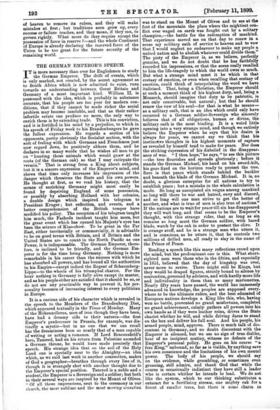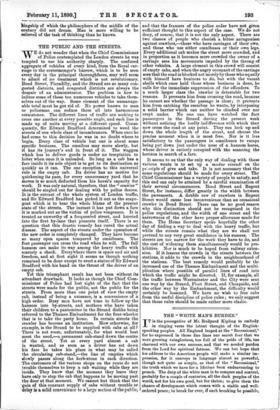THE GERMAN EMPEROR'S SPEECH.
IT is more necessary than ever for Englishmen to study the German Emperor. The drift of events, which is only marked, not created, by the secret agreement as to South Africa which is now admitted to exist, runs towards an understanding between Great Britain and Germany of a most important kind. William II. is posdessed with the idea, which is probably in substance accurate, that his people are too poor for modern con- ditions, that if they cannot be made richer the social problem may become insoluble, and that as their rather infertile estate can produce no more, the only way to enrich them is by extending trade. This is his conviction, and it is fortified in his mind by a prejudice, to which in his speech of Friday week to his Brandenburgers he gave the fullest expression. He regards a section of his opponents, pretty obviously the Socialist section, with the sort of feeling with which Germans and Frenchmen just now regard Jews, he positively abhors them, and he declares in so many words that he wishes all men to go on " hunting those animals which would gnaw at the roots (of the German oak) so that I may extirpate the vermin." That is strong from a King about subjects, but it is a sincere expression of the Emperor's mind, and shows that time only increases his impression of the danger which threatens the State and his own powers. He thought at first, as we read his history, that the means of enriching Germany might most easily be found by depriving England. of some possession, or possibly by absorbing Holland with her colonies, a double design which inspired his telegram to President Kruger ; but reflection, and events, and a better comprehension of the British temper have modified his policy. The reception of his telegram taught him much, the Fashoda incident taught him more, but the great event which has opened his Majesty's eyes has been the seizure of Kiao-chow. To be great in the Far East, either territorially or commercially, it is advisable to be on good terms with Britain, and if Britain and the United States are to count in the North Pacific as one Power, it is indispensable. The German Emperor, there- fore, is inclined to be friendly, and the German Em- peror is for the time being Germany. Nothing is more remarkable in his career than the success with which he has absorbed all powers, and has bound all the authorities in his Empire—except indeed the Regent of Schaumberg- Lippe—to the wheels of his triumphal chariot. For the hour nothing in Germany is fully alive except its master, and as his people either are satisfied that it should be so, or do not see any practicable way to prevent it, his per- sonality becomes of increasing interest to every politician in Europe.
It is a curious side of his character which is revealed in the speech to the Members of the Brandenburg Diet, which appeared textually in the Times of Monday. Many of the Hohenzollerns, men of iron though they have been, have had a dreamy side to their natures—the first Emperor's predecessor in Prussia, for example, was dis- tinctly a mystic—but in no one that we can recall has the dreaminess been so nearly that of a man capable of writing or acting a romance. If Lord Beaconsfield's hero, Tancred, had on his return from Palestine ascended a German throne, he would have made precisely that speech. His strange idea that on the soil of the Holy Land one is specially near to the Almighty—an idea which, as we said last week in another connection, makes of God a geographer—breathes through every line of it, though it is strangely shot with another thought due to the Emperor's special position. Tancred is a noble and a student, the Emperor is a Sovereign and a soldier; but both in their several ways are inspired by the Mount of Olives. " Of all those impressions, next to the ceremony in our church, the most sublime and the most moving sensation was to stand on the Mount of Olives and to see at the foot of the mountain the place where the mightiest con- flict ever waged on earth was fought out by a solitary champion,—the battle for the redemption of mankind. That experience moved me on that day to renew in a sense my military oath of service to heaven and to vow that I would neglect no endeavour to make my people a united nation and to abolish whatever could divide them." The piety of the Emperor is, as we believe, perfectly genuine, and we do not doubt that he has faithfully recorded his impressions, or that the scene really recalled to him the life-tragedy to which the world owes so much. But what a strange mind must it be which in that ecstasy of emotion, or even when recalling that ecstasy of emotion, could think of interpolating the word we have italicised. That, being a Christian, the Emperor should at such a moment think of his highest duty, and, being a Monarch, should imagine that duty to be patriotic, is not only conceivable, but natural ; but that he should renew the vow of his soul—for that is what he means— as a military oath, that is an idea which could only have occurred to a German soldier-Sovereign who sincerely believes that of all obligations, human or divine, the military oath is the most binding. It is a weird little opening into a very strange mind, and though we entirely believe the Emperor when he says that his desire is always for peace, we cannot say we think that his instinctive thoughts in his highest moments of rapture as revealed by himself tend to make for peace. Nor does the striking expression of his disbelief in the disappear- ance of war. " I then hope," he says, " to see this picture —the tree flourishes and spreads gloriously ; before it stands the German Michael, his hand on his sword-hilt, his gaze fixed on the horizon ready to protect the tree. Sure is that peace which stands behind the buckler and beneath the blade of the German Michael. It is, no doubt, a glorious enterprise for all nations to try to establish peace ; but a mistake in the whole calculation is made. So long as unexpiated sin reigns among mankind so long will there be war and hatred, envy and discord, and so long will one man strive to get the better of another, and what is true of men is also true of nations." If the nations are to wait for peace till sin has disappeared they will wait long, and that seems to be the Emperor's thought, with this strange rider, that as long as sin remains so long must the German soldier, with bared blade, watch by the oak in order to protect the olive. It is strange stuff, and he is a strange man who utters it, and is conscious, as he utters it, that he controls two millions of drilled men, all ready to slay in the name of the Prince of Peace.
Reading a speech like this many reflections crowd upon the mind, but the predominant one is this. What short- sighted men were those who in the fifties, and especially in 1851, believed that the day of kingship was over, never more to revive. There might still be Kings, but they would be draped figures, strictly hound to silence by convention, governed by advisers, and with hardly more life and individuality in them than so many marionettes. Nearly fifty years have passed, the world has immensely advanced in knowledge, the peoples are supposed every- where to be the ultimate rulers, and the best educated of European nations develops a King like this, who, having won no battle, prevented no grand misfortune, completed no grand achievement, calmly. gathers all powers into his own hands as if they were leather reins, drives the State chariot whither he will, and while driving dares to stand on the box and deliver his full soul. And his people, his armed people, mind, approve. There is much talk of dis- content in Germany, and no doubt discontent with the Emperor is silenced, but we see no sign of true dislike, hear of no incipient mutiny, witness no defeats of the Emperor's personal policy. He goes on his course "a free King," unbound, so far as is visible, by anything save his own conscience and the limitations of his own mental power. The body of his people, we should say on the evidence, while grumbling, or sometimes even groaning, still admire, and thank God that while the course is occasionally indistinct they have still a leader who is certain whither he intends to lead. We do not like the system, which to our thinking substitutes a cataract for a fertilising stream, one mighty oak for a forest of smaller trees, but there is some charm in kingship of which the philosophers of the middle of the century did not dream. Man is more willing to be relieved of the task of thinking than he knows.







































 Previous page
Previous page